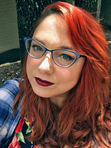Banned Books Month: Guest Post from Monique Polak: Books Test Limits
People become writers for lots of reasons.
I used to hide under the dining room table when my parents had company for dinner – it was the best place for hearing stories.
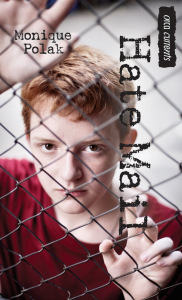
Orca Currents, September 2014.
That may be one of the reasons I became a writer.
Another was that my room was the little blue one upstairs where my parents stored their books.
I still remember the titles of some of the paperbacks on the white wooden shelves behind my bed. ROSEMARY’S BABY. THE SECRET OF SANTA VITTORIA. OF HUMAN BONDAGE. I liked St. Thomas Aquinas’s SUMMA THEOLOGICA best because it had a black leather cover and inside, a silky red ribbon to mark the page I was on.
I read those books. Of course, there was a lot in them I did not understand. But I knew they were important, that stories mattered, and that words could do magical things, like making worlds come alive. And my parents never ever – not even once – forbid me from reading those books. Just as they never told me to get out from the under the table where I was eavesdropping, even though they must have known I was there.
Today, I am the author of 16 novels for young adults and I have taught English Literature at Marianopolis College here in Montreal for 30 years. I am also against banning any book ever.
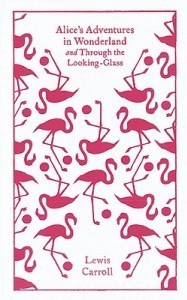
Penguin Classics Hardcover Edition, March 2010.
My favorite book of all time, Lewis Carroll’s ALICE’S ADVENTURES IN WONDERLAND, was banned in New Hampshire in 1900 and in China in 1931. People objected to the book’s references to sex and drugs.
I wrote my Master’s thesis on ALICE. By the time my friends in the English Department were halfway through their graduate work, they were sick of their subjects. That never happened to me. I am not exaggerating when I tell you I have read ALICE’S ADVENTURES IN WONDERLAND more than 200 times – and that every time I read it, I learn something new.
In ALICE, the caterpillar (yes, he is smoking a hookah pipe and yes, he is sitting on a mushroom) asks Alice, “Who in the world are you?” There can, I think, be no more important – or difficult – question. When I teach the book to teenagers, I use it in part to discuss the complex issue of identity. Like Alice, we are constantly changing, and yet, some essential part of us remains the same. I also use it to discuss both sex and drugs, subjects that, in my mind, need to be calmly and openly talked about in the classroom.
I happen to teach at the same college I attended when I was my students’ age – and I can still remember what I wanted to know when I was seventeen and eighteen. These are the questions I try to address in my classroom – and also in my fiction writing.
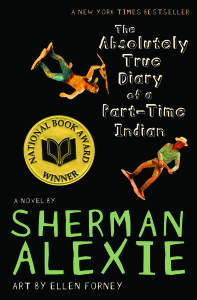
Little, Brown Books for Young Readers, September 2007.
A book I fell in love with more recently, Sherman Alexie’s THE ABSOLUTELY TRUE DIARY OF A PART-TIME INDIAN, was banned earlier this year in Idaho schools. There, authorities argued that the book should be banned because it contained “filthy words” and alluded to masturbation.
There is swearing in The Absolutely True Diary of a Part-Time Indian and there are references to masturbation. All that is fine with me. Most teens I know swear – and they are all curious about masturbation, another topic too seldom discussed in the classroom.
But there is way more to Alexie’s novel. The narrator, Arnold Spirit, is Native American. He lives on a reservation in Washington State, but is bussed to a school where the other students are white. What this book is really about is racism, prejudice and overcoming adversity – subjects that readers of all ages need to know about and think about, and which are particularly, painfully relevant in the wake of such recent events as those that took place in Ferguson, Missouri.
Like many youngsters, Arnold faces terrible obstacles. Luckily, Arnold finds solace in drawing cartoons and in reading. Here is one of the things Arnold has to say about reading: “I grabbed my book and opened it up. I wanted to smell it. Heck, I wanted to kiss it. Yes, kiss it. That’s right, I am a book kisser. Maybe that’s kind of perverted or maybe it’s just romantic and highly intelligent.”
Alexie’s book will break readers’ hearts. It will also make them laugh out loud in spots. I laughed out loud when I read Arnold describe himself as “a book kisser.”
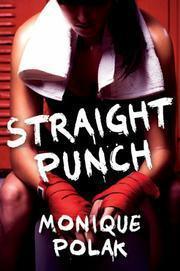
Orca Books, March 2014.
Books can open us up to other lives and other experiences. Through them, we can learn about subjects we are curious about, as well as subjects we might never have thought about were it not for some particular book.
I often tell my students that books – both reading and writing them – have saved my life. In my saddest, most lost moments, I have, like Arnold Spirit, found comfort in stories.
Here’s my message to young readers: Read! Read everything you can, everything you are interested in, and even what may seem less interesting.
And here’s my message to parents and educators: Encourage young people to read and to write – without limits, without bans. Do everything you can to try and turn them all into book kissers.
Monique Polak is the author of 16 novels for young adults, the most recent of which is HATE MAIL (Orca Book Publishers). Her historical novel WHAT WORLD IS LEFT won the 2009 Quebec Writers’ Federation Prize for Children’s and YA Literature. Monique is a frequent contributor to the Montreal Gazette and to Postmedia publications across Canada. She is also a columnist on ICI Radio-Canada’s Plus on est de fous, plus on lit! Monique has taught English and Humanities at Marianopolis College in Montreal for 30 years. Learn more about her work by visiting www.moniquepolak.com






